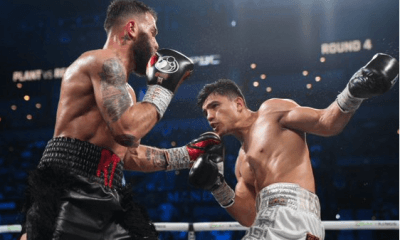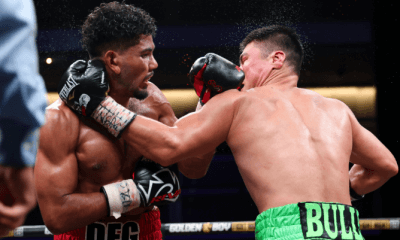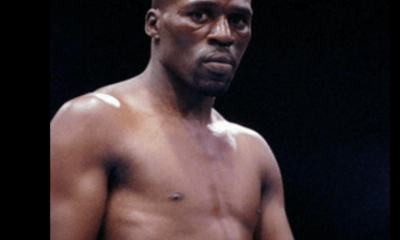Featured Articles
The Hauser Report: Oleksandr Usyk Upsets the Applecart
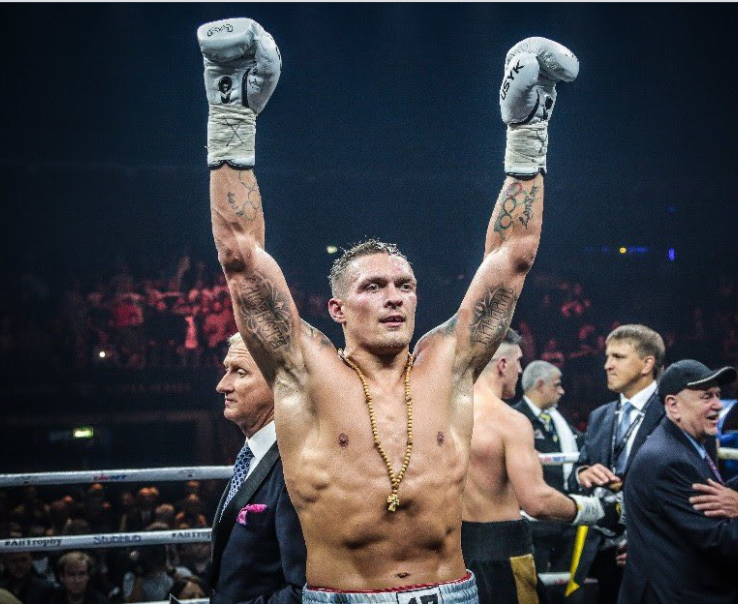
On Saturday night, Oleksandr Usyk won a unanimous decision over Anthony Joshua at Tottenham Hotspur Stadium in London to claim the WBA, IBF, and WBO heavyweight titles. With that victory, Usyk follows in the footsteps of Vitali and Wladimir Klitschko to become the third heavyweight beltholder from Ukraine.
Joshua has an elegance about him. Unlike some heavyweights at the top of today’s class, he seems rational and sincere when he speaks. “The world is cruel,” he told Sky Sports a year ago. “You’ve got to have a thick skin. One minute you’re on top of the world, and the next minute you’re not. That’s the name of the game we’re in.”
“AJ” has accomplished a lot in the past ten years. He won a gold medal in the super-heavyweight division at the 2012 London Olympics, became enormously popular in his homeland, and has earned tens of millions of dollars fighting. What he hasn’t done is prove himself to be a great fighter. The promise that seemed to be there after he climbed off the canvas to beat Wladimir Klitschko in an enthralling spectacle before 90,000 screaming fans at Wembley Stadium in 2017 never fully blossomed.
The Klitschko fight changed Joshua. Instead of gaining confidence from walking through fire and prevailing, he seemed to be a more tentative and vulnerable fighter afterward. Less-than-scintillating victories over Carlos Takam, Joseph Parker, and Alexander Povetkin followed. Then promoter Eddie Hearn brought Joshua to America to showcase him at Madison Square Garden against the corpulent Andy Ruiz. Shockingly, Ruiz knocked AJ down four times and stopped him in seven rounds.
Six months later in Saudi Arabia, Joshua gained a measure of revenge when he outboxed a grossly-out-of-shape Ruiz to reclaim his belts. But AJ hardly looked like a conqueror. A good jab doesn’t just score points and keep an opponent at bay. It cuts; it hurts; it shakes up the opponent. Against Ruiz the second time around, Joshua threw a stay-away-from-me jab all night. As Jimmy Tobin wrote, it was as though he’d been transformed “from wild boar to truffle pig.”
A cautiously-fought victory over Kubrat Pulev followed. “It’s easy to watch on YouTube and be confident,” Joshua said afterward. “Easy to watch from the outside. But when you’re in front of someone, actually in the ring, it’s a completely different ballgame.”
Usyk, like Joshua, won a gold medal at the 2012 Olympics (Oleksandr’s was in the heavyweight division). He’d distinguished himself in the professional ranks by unifying the cruiserweight titles and had become the mandatory challenger for AJ’s IBF belt by virtue of lackluster victories over Chazz Witherspoon and Dereck Chisora.
Joshua was a 5-to-2 betting favorite. Usyk is a tricky southpaw with a 18-0 (13 KOs) professional record. But AJ has heavy hands and a devastating uppercut. Twenty-two of his 24 victories had come by knockout. His chin is suspect but Oleksandr was deemed ill-equipped to exploit that vulnerability. All one had to do was watch Usyk struggle against Witherspoon and Chisora to conclude that AJ was too big a mountain for him to climb. There’s a reason that there are weight classes in boxing.
At the weigh-in, Joshua was twenty pounds heavier than Usyk. It was, one observer opined, “a fight between a heavyweight and a wanna-be heavyweight.” The greatest threat to Joshua seemed to be Joshua.
One day before the bout, AJ was asked what would be next on his schedule after fighting Usyk. The assumption was that his next opponent would be the winner of Tyson Fury vs. Deontay Wilder (who are scheduled to fight on October 9).
“I’ve got a rematch clause if the worst happens,” Joshua answered. “So, if I lose, I’m fighting Usyk again; the undisputed gets put on hold. If I win, I’ll fight either one of them. If Fury wins, I’ll fight Fury. If Wilder wins, I’ll fight Wilder.”
That answer was remarkable. Fighters often hype their opponent to build a promotion. But the phrase “if I lose” rarely escapes their lips.
On fight night, the atmosphere was electric. The 65,000-seat Tottenham Hotspur Stadium had been sold out within twenty-four hours of tickets going on sale.
On DAZN’s televised undercard, Florian Marku won a split decision over Maxim Prodan. Then Callum Smith scored a scary one-punch knockout of Lenin Castillo. Next up, Sonni Martinez (a 2-and-4 fighter whose victories had come against fighters with 4 wins in 20 fights) exposed Campbell Hatton’s deficiencies as a fighter and also Marcus McDonnell’s deficiencies as a referee and judge. McDonnell’s 58-57 scorecard (he was the sole arbiter) in Hatton’s favor was disgusting. After that, Lawrence Okolie predictably knocked out an overmatched Dilan Prasovic in three rounds.
Joshua seemed to enjoy the fireworks and blaring music that accompanied his ring walk. It had been a long time since he’d fought before a large roaring crowd in England. The stage was set. Then the fight started.
For Joshua loyalists, the contest was akin to opening a beautifully-wrapped present on Christmas morning and finding bath towels inside instead of a much-desired stylish coat.
Usyk began cautiously, moving around the ring, throwing jabs like a pesky fly. AJ looked clumsy and a bit befuddled. Oleksandr’s southpaw style was giving him trouble. The proceedings brought to mind the advice that trainer Emanuel Steward gave to Lennox Lewis on the night that Lewis fought Ray Mercer. The plan that night had been for Lennox to outbox Mercer. Except the plan wasn’t working. In the middle rounds, sensing that the fight was slipping away, Steward told Lewis, “Just f***ing fight him.” Lennox did as instructed and won a narrow decision.
Rob McCracken (Joshua’s trainer) should have given AJ the same advice. When AJ went to Usyk’s body (which was hittable), he seemed to hurt him. But he didn’t do it often enough. Instead of trading with Usyk, for most of the night Joshua seemed reluctant to let his hands go and looked less interested in hitting than concerned about getting hit.
Joshua came on a bit in the middle rounds but then relinquished control again. He needed to impose his size and strength on Usyk but didn’t. He didn’t fight like a heavyweight champion is supposed to fight.
As the bout progressed, Usyk suffered cuts above and below his right eye. AJ’s nose was bloodied and there was a pronounced swelling beneath his right eye.
Usyk fought the final two rounds as though he needed them to win. Joshua fought the final two rounds like a beaten fighter and was in trouble at the final bell.
Give the judges credit for honest scoring. Their 117-112, 116-112, 115-113 scorecards were on the mark.
“This was the biggest fight in my career, but it wasn’t the hardest,” Usyk said afterward. “There were a couple of moments where Anthony pushed me hard but nothing special.”
So much for the megafight between Joshua and the winner of Tyson Fury vs. Deontay Wilder. If the scenario that unfolded in Tottenham Hotspur Stadium on Saturday night seemed similar to Joshua-Ruiz I upending the planned megafight between Joshua and Wilder two years ago, that’s because it was.
The loss to Ruiz raised questions about Joshua. Joshua-Usyk answered them. AJ is a good heavyweight, not a great one.
Photo credit: Mark Robinson / Matchroom
Thomas Hauser’s email address is thomashauserwriter@gmail.com. His next book – Broken Dreams: Another Year Inside Boxing – will be published in October by the University of Arkansas Press. In 2004, the Boxing Writers Association of America honored Hauser with the Nat Fleischer Award for career excellence in boxing journalism. In 2019, Hauser was selected for boxing’s highest honor – induction into the International Boxing Hall of Fame.
Check out more boxing news on video at the Boxing Channel
To comment on this story in the Fight Forum CLICK HERE
-

 Featured Articles3 weeks ago
Featured Articles3 weeks agoThomas Hauser’s Literary Notes: Johnny Greaves Tells a Sad Tale
-
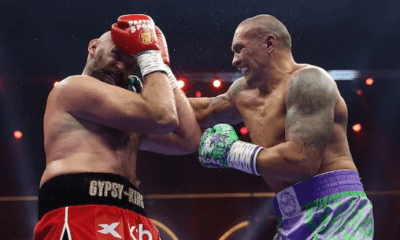
 Featured Articles2 weeks ago
Featured Articles2 weeks agoBoxing Notes and Nuggets from Thomas Hauser
-
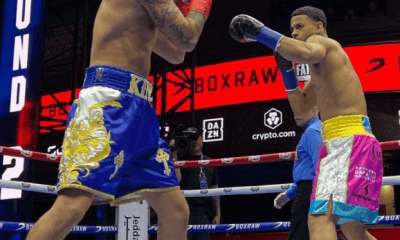
 Featured Articles4 weeks ago
Featured Articles4 weeks agoRolly Romero Upsets Ryan Garcia in the Finale of a Times Square Tripleheader
-
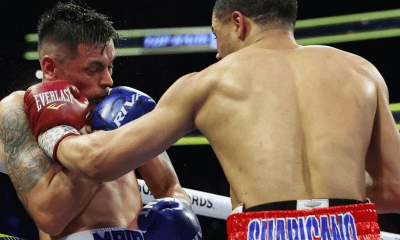
 Featured Articles4 weeks ago
Featured Articles4 weeks agoUndercard Results and Recaps from the Inoue-Cardenas Show in Las Vegas
-
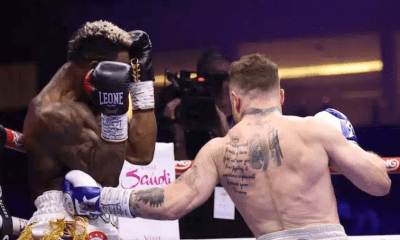
 Featured Articles4 weeks ago
Featured Articles4 weeks agoCanelo Alvarez Upends Dancing Machine William Scull in Saudi Arabia
-
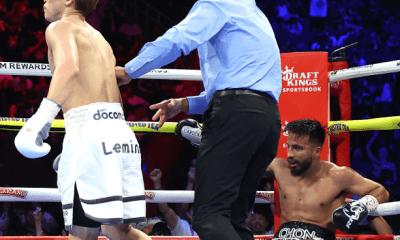
 Featured Articles4 weeks ago
Featured Articles4 weeks agoBombs Away in Las Vegas where Inoue and Espinoza Scored Smashing Triumphs
-
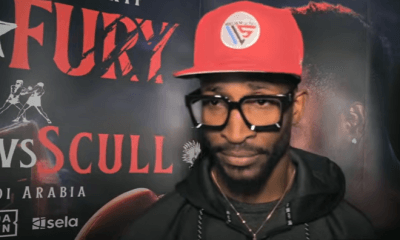
 Featured Articles4 weeks ago
Featured Articles4 weeks agoArne’s Almanac: The Good, the Bad, and the (Mostly) Ugly; a Weekend Boxing Recap and More
-
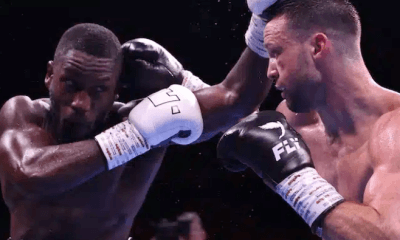
 Featured Articles1 week ago
Featured Articles1 week agoEkow Essuman Upsets Josh Taylor and Moses Itauma Blasts Out Mike Balogun in Glasgow

